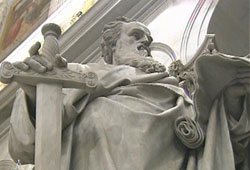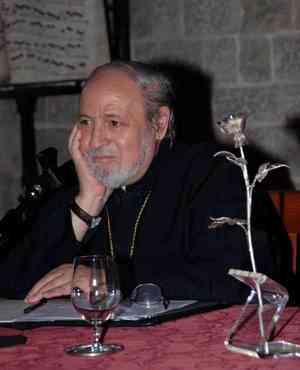Tomorrow, January 25, the Solemnity of the Conversion of Saint Paul, ends the annual observance of our praying for unity among Christians. I hope you’ve had this intention in prayer this week! This afternoon I want to reflect a little bit on the need for unity among Christians by looking at history. A good Christian always has a sense of history. But referencing history is not a mere exercise; it is a dialogue, it is a manner of listening to another; history is to see the finger of God in good of human history seeing wisdom, knowledge, love, service, community. Indeed, God’s plan is always revealed in history. The concreteness of history charts the course of the future and not merely for the short term. The longview is a value!
These days I think we are moving away from praying and working for unity among Christians. The three recent popes have given us a vision for ecumenical dialogue and engagement. Just look at what Benedict did; look at what Francis is doing. Yet, those of us 3000 miles away from the Holy See are experiencing the heart’s tepidity. More and more I sense the seminarians, priests and bishops and laity give lip service to ecumenical relations but are doing little concrete. Here in CT I have not heard one prayer for Christian unity at Mass, or other services of prayer that I have been since the 18th; I have not seen the State’s bishops exhort the faithful to pray for Christian unity nor have anything meaningful for us to engage our thinking anew. Sad. We prayed for intentions of Pro Life –a most needed intention, don’t get me wrong, but we don’t have to be so binary in our thinking and acting as a community of believers as Pope Benedict showed us. He said and demonstrated that ecumenism is the way of being Catholic, and the lack attention is quite startling. It seems that vigor of year’s past ecumenism is collapsing. But it doesn’t have to.
We should ardently pray to God through the intercession of Blessed Gabriella Maria Sagheddu, an Apostle for Unity.
What follows was prepared jointly and published by The Pontifical Council for Promoting Christian Unity and The Commission on Faith and Order of the World Council of Churches.
c. 1740 In Scotland a Pentecostal movement arose, with North American links, whose revivalist message included prayers for and with all churches.
1820 The Rev. James Haldane Stewart publishes “Hints for the General Union of Christians for the Outpouring of the Spirit.”
1840 The Rev. Ignatius Spencer, a convert to Roman Catholicism, suggests a ‘Union of Prayer for Unity’.
1867 The First Lambeth Conference of Anglican Bishops emphasizes prayer for unity in the Preamble to its Resolutions.
1894 Pope Leo XIII encourages the practice of a Prayer Octave for Unity in the context of Pentecost.
1908 First observance of the ‘Church Unity Octave’ initiated by the Rev. Paul Wattson.
1926 The Faith and Order movement begins publishing “Suggestions for an Octave of Prayer for Christian Unity.”
1935 Abbé Paul Couturier of France advocates the ‘Universal Week of Prayer for Christian Unity’ on the inclusive basis of prayer for “the unity Christ wills by the means he wills”.
1958 Unité Chrétienne (Lyons, France) and the Faith and Order Commission of the World Council of Churches begin co-operative preparation of materials for the Week of Prayer.
1964 In Jerusalem, Pope Paul VI and Patriarch Athenagoras I prayed together Jesus’ prayer “that they all may be one” (John 17).
1964 The Decree on Ecumenism of Vatican II emphasizes that prayer is the soul of the ecumenical movement and encourages observance of the Week of Prayer.
1966 The Faith and Order Commission of the World Council of Churches and the Secretariat for Promoting Christian Unity [now known as the Pontifical Council for Promoting Christian Unity] begin official joint preparation of the Week of Prayer material.
1968 First official use of Week of Prayer material prepared jointly by Faith and Order and the Secretariat for Promoting Christian Unity (now known as the Pontifical Council for Promoting Christian Unity).
1975 First use of Week of Prayer material based on a draft text prepared by a local ecumenical group. An Australian group was the first to take up this plan in preparing the 1975 initial draft.
1988 Week of Prayer materials were used in the inaugural worship for The Christian Federation of Malaysia, which links the major Christian groupings in that country.
1994 International group preparing text for 1996 included representatives from YMCA and YWCA.
2004 Agreement reached that resources for the Week of Prayer for Christian Unity be jointly published and produced in the same format by Faith and Order (WCC) and the Pontifical Council for Promoting Christian Unity (Catholic Church).
2008 Commemoration of the 100th anniversary of the Week of Prayer for Christian Unity. (Its predecessor, the Church Unity Octave, was first observed in 1908).

